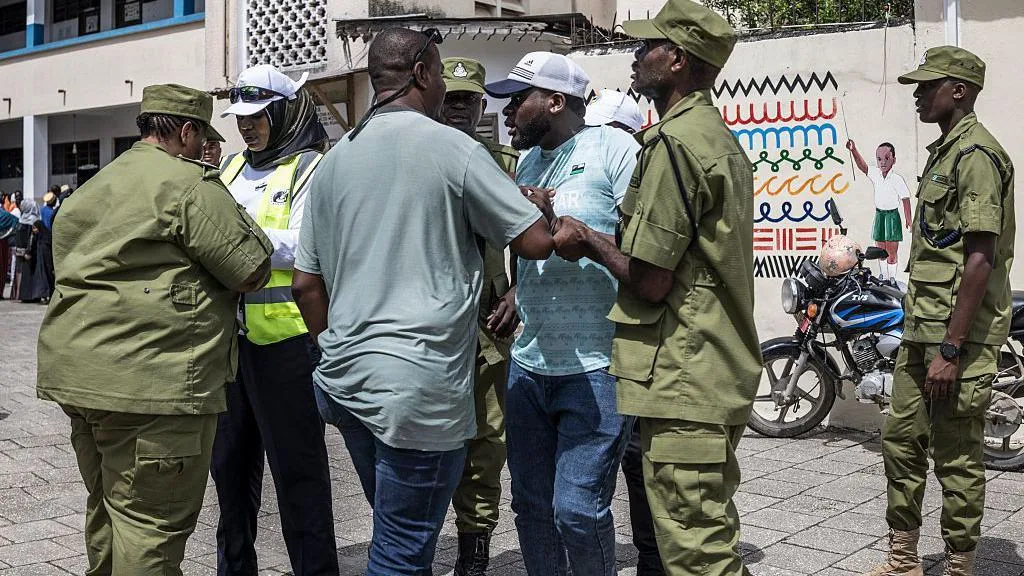
Kenya Calls for Safety of Its Citizens in Tanzania
In the wake of post-election violence in Tanzania, the Kenyan government has urged its neighbor to guarantee the safety of Kenyan nationals living and working in the country. Kenya’s Foreign Affairs Minister Musalia Mudavadi emphasized that some Kenyans have reportedly been targeted, harassed, and even injured during a brutal crackdown following Tanzania’s disputed October 29 election.
Reports indicate that hundreds of civilians were killed in the unrest, with security forces allegedly using excessive force against demonstrators. The violence has left many Kenyan families deeply concerned for their relatives’ safety.
“The rights of some Kenyans have been violated, and formal reports have been submitted to Tanzanian authorities for appropriate action,” Mudavadi said.
Election Context: Samia Suluhu Hassan’s Landslide Win
President Samia Suluhu Hassan officially won re-election with 98% of the vote, following an election boycotted by key opposition parties. In her inauguration speech, she condemned the violence but blamed foreigners for stoking unrest. Despite her assurances, Kenyan citizens have reportedly been caught in the crossfire, raising urgent diplomatic concerns.
Mudavadi told his Tanzanian counterpart, Foreign Minister Mahmoud Thabit Kombo, that the rights, safety, and dignity of Kenyans living in Tanzania must be safeguarded through diplomatic and consular channels.
Kenyans Targeted Amid Security Crackdown
Tanzanian authorities claim some foreigners crossed into the country illegally “with the intention to commit crimes, including causing unrest.” However, Kenyan human rights activists say citizens are being unfairly used as scapegoats for violent incidents during the crackdown.
Hussein Khalid, a Kenyan human rights advocate, warned:
“Kenyans in Tanzania are not safe. They are being targeted and harassed by security forces.”
Tragically, some Kenyans have reportedly been killed or injured. John Ogutu, a Kenyan teacher in Dar es Salaam, was shot while on his way to buy food, and his body has reportedly not been traced for repatriation and burial. Hospitals in Dar es Salaam have been collecting bodies of those believed to have died in post-election protests.
Diplomatic Response and Citizen Protection Measures
Kenya’s foreign affairs ministry is actively compiling lists of Kenyans potentially affected by the unrest. Families are urged to provide names, addresses, and emergency contacts to ensure their relatives are accounted for.
The government is also taking steps to address public concerns over the perceived slow response in tracing and assisting nationals in distress. Many Kenyans, particularly those working in private institutions, are reportedly leaving Tanzania following warnings from authorities about work permits.
Regional Tensions and Historical Context
Tanzania and Kenya, both members of the East African Community (EAC), have experienced periodic diplomatic strains. Earlier this year, relations were tested when Kenyan citizens were detained while observing opposition trials in Tanzania. Notable activists, including Boniface Mwangi and Ugandan activist Agather Atuhaire, were reported missing and allegedly subjected to torture.
Since assuming office in 2021 as Tanzania’s first female president, Samia Suluhu Hassan initially eased political repression. However, the space for opposition and civil liberties has reportedly narrowed in recent years, culminating in the disputed 2025 elections.
Conclusion
The escalating post-election crisis in Tanzania has heightened concerns for Kenyans living in the country, prompting urgent diplomatic interventions. The situation underscores the broader challenges of protecting foreign nationals amid political instability and highlights the need for accountability and transparent governance in East Africa.


Leave a Reply